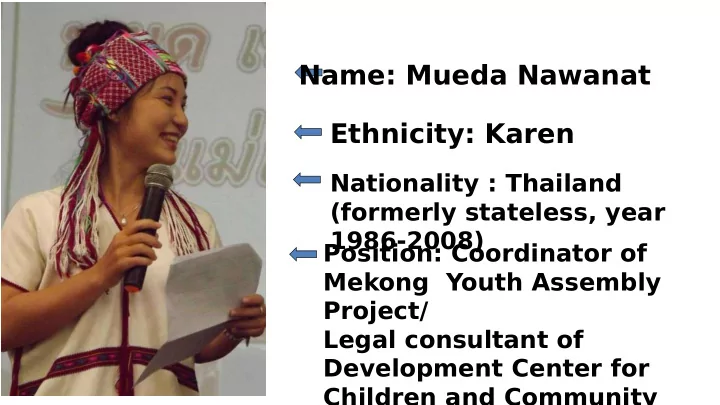

Name: Mueda Nawanat Ethnicity: Karen Nationality : Thailand (formerly stateless, year 1986-2008) Position: Coordinator of Mekong Youth Assembly Project/ Legal consultant of Development Center for Children and Community
Traditional Knowledge on Environment - Umbilical Cord of infant: The parents will bring umbilical of their children keep on the tree. Why?
Tale, Poem: The parents and elders tell tales and poems. All stories link with local beliefs in spirits of the forest, river, and land.
Belief “spirit” Before and after farming, we will do a ceremony to thank the spirits in the nature.
Rotational Farming: One village will do the farm together and every year will move to other place together. 2 nd 3 rd 4 th 1 st years years years years
Forest ordination : If a tree gets tied by a yellow robe, it isn’t allowed to be cut
What happened in my communit and Mekong region?
National Park: T ake the indigenous community to make it a national park
Hydropower Dam : To produce electricity
Mining
We work with…
We focus Ecological Child Right on… Hum Child an Environm Rights ent Right Rights s
oung Indigenous Women’s Participation
Recommendation • ASEAN commission on Promotion and Protection of the Rights of Women and Children (ACWC) together with ASEAN Intergovernmental Commission on Human Rights (AICHR) must establish the ECRs’ committee and a safeguard to ensure that all development projects respecting the youth and child rights. All private and state development projects must comply the ECRs’ safeguard in operating any domestic or trans-boundary development schemes. • All ASEAN states are obligated to protect the children as well as youth who are their citizens by legislating private companies to either apply the Child Right Risk Assessment in their Environmental Impact Assessment (EIA), or Children Rights and Business Principles (CRBP), or Social Impact Assessment (SIA), or conduct a Child Right Risk Assessment separately as prior to be given an approval to operate any development projects. • All development projects must engage youth and children in all decision-making procedures and at all levels. T ogether, youth and
We strongly Believe…We can change our future by our hand…
Recommend
More recommend